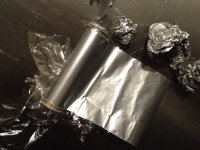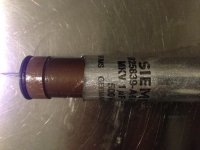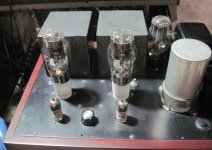...thought that the washing machine cylinder could make a good cardioid box for a woofer with the back sealed and the oposite side with the woofer... Too bad it's metal... maybe with a fabric sandwich around ?!
They usually come with some damping material inside, for acoustical reasons 🙂
We all know, the naked Vishays sound better, so audiophiles should peel off the plastic from the Silmics too.
Yep the vishay sounds better, it's not hard against a silmic (I really don't like the silmics though the one serie was usefull in serie as the SII with shiny and oscilating oaps at hidding things and matt and dark the sound (well sorry for the language shortcut, if I die it will be a scientist that drove on me with a 4x4)
I.e. a suit on a Vishay will alwats souds better than a naked Silmic II... the discussion turns on the disgusting side of audio porn ... I often laughed at people whom peeled of their 105°C caps in a smal rectifier circuitry for DACS or Pre...
I.e. a suit on a Vishay will alwats souds better than a naked Silmic II... the discussion turns on the disgusting side of audio porn ... I often laughed at people whom peeled of their 105°C caps in a smal rectifier circuitry for DACS or Pre...
Last edited:
Talking about speakers, the irony is my beloved Quad ESL57's have those crappy ceramic caps in the crossovers AND the power supplies. And yet I haven't heard anything that sounds better to me.
It is amazing what crappy ceramic caps can accomplish.
Strangly I do use the Violet/purple Elnas that are basic polarized lytics and that are forgiving caps for power supplies smoothing purpose... However not "long life" or "105°C either !
............... I always use 1W resistors at least cos they sound better than lower wattage.
I see that we are fine-tuning the purpose of the OP, we have already gone from hearing exquisite differences in capacitors to hearing them in resistors due to the difference in wattage ...
I am assuming it is resistors in the signal path as I understand it to be the capacitors issue, although I may be wrong and that statement from what you hear refers to resistors anywhere in the circuit, it will always sound better 1 watt than 1/4 watts!
Extraordinary.
Last edited by a moderator:
Hey Iggy
There's probably 100s against the 2 of us who don't like Silmic ll ya. Lol
Leave me out, please.
There is a reason those big polypropylene high voltage /mains voltage capacitors are cheap ---low quality polyprop. internally and yes I tried a few 20 years ago ( or more ) --then sawed them open to inspect them ---------.
This is a fun thread. By the way, the company I'm working - a rather large producer of welding and solar inverters - is using exclusivley Rubycon in the high voltage parts. Doesn't say anything regarding audio, but we have 10years+ warranties. And that does say something about lifetime.
The general public in the UK don't have your 10 year guarantee Weissi and they only get a limited guarantee and under the Sale of Goods Act /Consumer Rights Act its the seller they deal with NOT the manufacturer. .
So 10 years warranties only apply to businesses .
So 10 years warranties only apply to businesses .
There is a reason those big polypropylene high voltage /mains voltage capacitors are cheap ---low quality polyprop. internally and yes I tried a few 20 years ago ( or more ) --then sawed them open to inspect them ---------.
What did you do with all that oil ?
I once opened a small axial MKV
Attachments
Last edited:
We are talking the motor start type ---aren't we ?
I bought from Maplin (UK ) before young people stopped building electronics and went virtual helped with the removal of factories --helped to close down the business .
Very big issue with me in School teaching --social dogma -first-second-third --engineering ---"whats that --I have a screwdriver is that engineering" ?🙂
Take up cooking young men for the service industry---er no thanks cant cook - can use a microwave though.
I bought from Maplin (UK ) before young people stopped building electronics and went virtual helped with the removal of factories --helped to close down the business .
Very big issue with me in School teaching --social dogma -first-second-third --engineering ---"whats that --I have a screwdriver is that engineering" ?🙂
Take up cooking young men for the service industry---er no thanks cant cook - can use a microwave though.
Last edited by a moderator:
Thats a good point Diyiggy JLH recommended them and I used them .
But Polypropylene won out , I always use the "real deal"- NON metalised film types -dearer but worth it .
In scientific tests they come out quite good and for those of the subjective persuasion some think the sound "better " than polypropylene but I am talking non metalised .
But Polypropylene won out , I always use the "real deal"- NON metalised film types -dearer but worth it .
In scientific tests they come out quite good and for those of the subjective persuasion some think the sound "better " than polypropylene but I am talking non metalised .
Last edited by a moderator:
We hear the same, I like the KP but they are a little hard to source in the uF range...
You can find sometimes some nos Wima MKC yet... too much expensive and the russians are not so good.
You can find sometimes some nos Wima MKC yet... too much expensive and the russians are not so good.
Be cautious Tony, with these caps sound might cause you to wobble like the washing machine too 😛😛😛
Joke aside I've been hearing good things about these MKV caps but never get to hear them first hand.
who? me? 😀
i have used similar GE caps in a tube amp i made, 40ufd.....the owner was happy, and that is good enough for me...this is a D3a/2A3 single ended amp.
Attachments
who? me? 😀
i have used similar GE caps in a tube amp i made, 40ufd.....the owner was happy, and that is good enough for me...this is a D3a/2A3 single ended amp.
Want one thing like that as I/V stage for a tda1541A with matched D3A 🙂 and the the 2A3 as the buf or at leat to play a single 12" FR 😎
A few years back i experimented a bit with aircaps. Replacing pF riaa values between polystyrene, silver micas, kp, aircaps and home made teflons.
Results were rather startling but in the end could not really live with the aircaps. Perhaps the large size made them too vulnerable to rf noise. Or microphonics. At first glance they had an extreme "audiophile" character, speed, hf extension, jump factor. Sadly, in the longer term unlistenably bright and thin.
Results were rather startling but in the end could not really live with the aircaps. Perhaps the large size made them too vulnerable to rf noise. Or microphonics. At first glance they had an extreme "audiophile" character, speed, hf extension, jump factor. Sadly, in the longer term unlistenably bright and thin.
Clarity Caps have a surprisingly impressive capacitance to volume ratio.
I believe this is only true of their cheap range. The MR / CMR are not nearly as impressive.
- Home
- Design & Build
- Parts
- Best electrolytic capacitors


